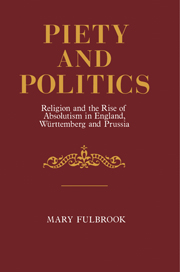Book contents
- Frontmatter
- Contents
- Preface
- 1 Introduction: cases and controversies
- 2 In pursuit of further reformation
- 3 State and society: the attempts at absolutism
- 4 The established church and toleration
- 5 From reform to revolution: Puritanism in England
- 6 From reform to retreat: Pietism in Württemberg
- 7 From reform to state religion: Pietism in Prussia
- 8 Conclusions and implications
- Bibliography
- Index
7 - From reform to state religion: Pietism in Prussia
Published online by Cambridge University Press: 09 January 2010
- Frontmatter
- Contents
- Preface
- 1 Introduction: cases and controversies
- 2 In pursuit of further reformation
- 3 State and society: the attempts at absolutism
- 4 The established church and toleration
- 5 From reform to revolution: Puritanism in England
- 6 From reform to retreat: Pietism in Württemberg
- 7 From reform to state religion: Pietism in Prussia
- 8 Conclusions and implications
- Bibliography
- Index
Summary
Those who followed the call of Spener to reform and renew the Christianity of their Protestant state churches represented initially a challenge to the established order of things. In Württemberg, as we have seen, this challenge was responded to with tolerance and incorporated into the life of the established church; one consequence of this toleration was that Württemberg Pietism lost its political dynamism and failed to develop into an effective, organised political force in national affairs. A different pattern of development took place in contemporaneous Prussia. Rather than being accepted by and incorporated into the church, Pietism was here opposed by orthodoxy. But the dynamics of the situation were such that the Pietist movement, rejected by orthodoxy, was not, as in England, rejected also by the state, but was rather, over time, absorbed by the state and transformed into a new form of orthodoxy, a new style of state religion.
Spener had left Frankfurt, the scene of the first Pietist gatherings and the place where he wrote his influential Pia Desideria, to take up a position in Dresden. But the Electorate of Saxony, where the orthodox church was closely allied with the state, soon became ill-disposed towards Pietism. The social disturbances occasioned by Pietist meetings in Leipzig, and the threats to the monopoly status of orthodoxy, aroused governmental disfavour; and the ruler found listening to Spener's outspoken preaching against the immorality of court life quite unbearable.
- Type
- Chapter
- Information
- Piety and PoliticsReligion and the Rise of Absolutism in England, Wurttemberg and Prussia, pp. 153 - 173Publisher: Cambridge University PressPrint publication year: 1983
- 1
- Cited by

